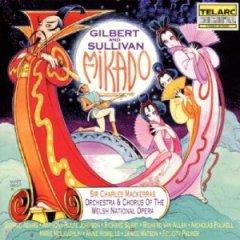Gilbert & Sullivan - The Mikado (Mackerras) [1992]
Gilbert & Sullivan - The Mikado (Mackerras) [1992]

1. Gilbert & Sullivan: The Mikado: Song and Chorus - Nanki-Poo (A Wandering Mistrel I) 3:01 2. Song and Chorus - Nanki-Poo (A wandering mistrel I ) 4:20 3. Song - Pish-Tush and Chorus (Our great Mikado, virtuous man) 2:58 4. Song - Pooh-Bah with Nanki-Poo and Pish-Tush (Young man, despair, likewise go to) 2:43 5. Recitative - Nanki-Poo and Pooh-Bah (And have I journeyed for a month) 0:49 6. Gilbert & Sullivan: The Mikado: Chorus with Solo - Ko-Ko (Behold the Lord High Executioner) 2:39 7. Song - Ko-Ko with Chorus of Nobles (As some day it may happen) "List Song" 2:00 8. Chorus of Schoolgirls (Comes A Train Of Little Ladies) 2:12 9. Gilbert & Sullivan: The Mikado: Trio - Yum-Yum, Peep-Bo and Pitti-Sing with Chorus of Schoolgirls (Three little maids from school are we) 1:32 10. Quartet - Yum-Yum, Peep-Bo, Pitti-Sing and Pooh-Bah, with Chorus of Schoolgirls (So please you, sire, we much regret) 1:55 11. Duet - Yum-Yum and Nanki-Poo (Were you not to Ko-Ko plighted) 2:27 12. Trio - Pooh-Bah, Ko-Ko and Pish-Tush (I am so proud) 3:00 13. Finale, Act One (With aspect stern and gloomy stride) 14:24 14. Solo - Pitti-Sing and Chorus of Schoolgirls (Braid the raven hair) 3:25 15. Song - Yum-Yum (The sun, whose rays are all ablaze) 3:10 16. Madrigal - Yum-Yum, Pitti-Sing, Nanki-Poo and Pish-Tush (Brightly dawns our wedding day) 3:58 17. Trio - Yum-Yum, Nanki-Poo and Ko-Ko (Here's a how-de-do! If I marry you!) 1:13 18. Entrance of Mikado and Katisha (Miya sama, miya sama) 2:46 19. Song - Mikado and Chorus (A more humane Mikado never did in Japan exist) 4:05 20. Trio and Chorus - Ko-Ko, Pitti-Sing, Pooh-Bah and Chorus (The criminal cried as he dropped him down) 3:24 21. Quintet - Pitti-Sing, Katisha, Ko-Ko, Pooh-Bah and Mikado (See how the Fates their gifts allot) 2:03 22. Duet - Nanki-Poo and Ko-Ko with Yum-Yum, Pitti-Sing and Pooh-Bah (The flowers that bloom in the spring) 1:36 23. Recitative and Song - Katisha (Alone, and yet alive) 2:56 24. Song - Ko-Ko (On a tree by a river, a little torn-tit sang, "Willow, tit-willow") 2:30 25. Duet - Katisha and Ko-Ko ((There is beauty in the bellow of the blast) 2:00 26. Finale, Act Two (For he's gone and married Yum-Yum) 1:53 The Mikado - Donald Adams Nanki-Poo - Anthony Rolfe Johnson Ko-Ko - Richard Stuart Pooh-Bah - Richard Van Allan Pish-Tush - Nicholas Folwell Yum-Yum - Marie McLaughlin Pitti-Sing - Anne Howells Peep-Bo - Janice Watson Katisha - Felicity Palmer Chorus of the Welsh National Opera Orchestra of the Welsh National Opera Sir Charles Mackerras – conductor
Regarded by G & S fans as the best of the all the operettas, The Mikado is given a sizzling performance by Sir Charles Mackerras, who--by leaving off the overture (which isn't by Sullivan anyway)-- manages to squeeze the piece onto one CD. He also shortens the "list" song since Gilbert's original features a prominent use of the "N" word, which, not withstanding the fact that he's making fun of people who performed in black-face in the 19th century, isn't worth the trouble it would cause by leaving it in. The singers are real singers; that is, they treat the music with respect and make it sound great. Of course, it is. ---David Hurwitz, amazon.com
The Mikado; or, The Town of Titipu is a comic opera in two acts, with music by Arthur Sullivan and libretto by W. S. Gilbert, their ninth of fourteen operatic collaborations. It opened on March 14, 1885, in London, where it ran at the Savoy Theatre for 672 performances, which was the second longest run for any work of musical theatre and one of the longest runs of any theatre piece up to that time. Before the end of 1885, it was estimated that, in Europe and America, at least 150 companies were producing the opera. The Mikado remains the most frequently performed Savoy Opera, and it is especially popular with amateur and school productions. The work has been translated into numerous languages and is one of the most frequently played musical theatre pieces in history.
Setting the opera in Japan, an exotic locale far away from Britain, allowed Gilbert to satirise British politics and institutions more freely by disguising them as Japanese. Gilbert used foreign or fictional locales in several operas, including The Mikado, Princess Ida, The Gondoliers, Utopia, Limited and The Grand Duke, to soften the impact of his pointed satire of British institutions.
download: uploaded yandex 4shared mediafire solidfiles mega zalivalka filecloudio anonfiles oboom
Last Updated (Tuesday, 20 May 2014 20:21)








